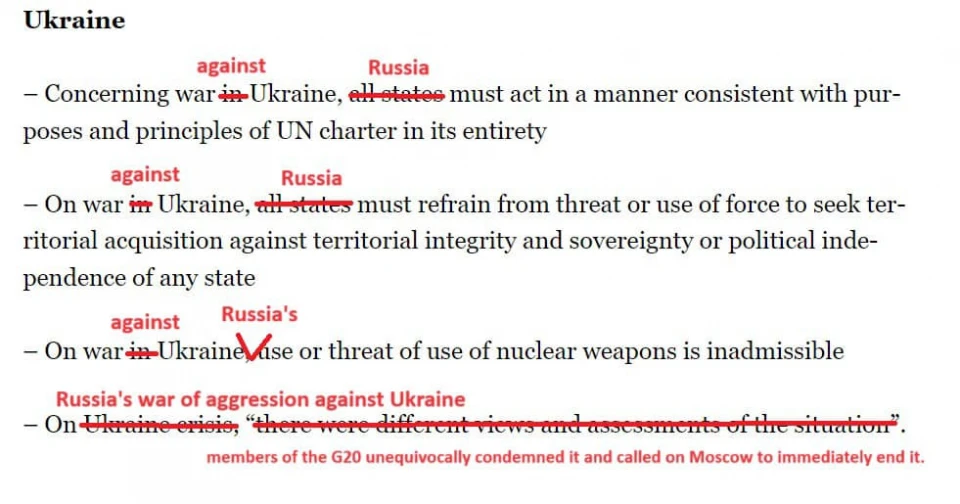
G20 leaders adopt declaration, fail to condemn Russian war on Ukraine
On September 9, the participants of the G20 summit adopted a final declaration: all states called for peace, but did not condemn Russia's full-scale aggression against Ukraine. The Ukrainian Foreign Ministry responded
This is stated in the text of the G20 summit declaration.
"We note with deep concern the immense human suffering and the adverse impact of wars and conflicts around the world," the paragraph 7 of the declaration says.
Further, the text states that the participants of the summit, regarding the war in Ukraine, reaffirm their positions and resolutions adopted by the UN Security Council and the UN General Assembly and emphasize that all States must act in a manner consistent with the purposes and principles of the UN Charter in its entirety.
In particular, according to the UN Charter, countries must refrain from the threat or use of force against the territorial integrity and sovereignty or political independence of any state.
The use or threat of use of nuclear weapons is unacceptable, the declaration emphasizes.
The summit participants point out that despite being the leading summit for international economic cooperation, the G20 is not a platform for addressing geopolitical and security issues. However, they recognize that these issues can have significant implications for the global economy.
"We highlighted the human suffering and negative added impacts of the war in Ukraine with regard to global food and energy security, supply chains, macro-financial stability, inflation and growth, which has complicated the policy environment for countries, especially developing and least developed countries which are still recovering from the COVID-19 pandemic and the economic disruption which has derailed progress towards the SDGs," the declaration says.
The G20 countries highly appreciate Turkey's efforts and the Istanbul agreements reached with the mediation of the UN, which consist of a Memorandum of Understanding between the Russian Federation and the UN Secretariat on the promotion of Russian food and fertilizers to world markets and the Black Sea Grain Initiative, from which Russia unilaterally withdrew.
"We call for their full, timely and effective implementation to ensure the immediate and unimpeded deliveries of grain, foodstuffs, and fertilizers/inputs from the Russian Federation and Ukraine. This is necessary to meet the demand in developing and least developed countries, particularly those in Africa," they added.
The declaration emphasized the importance of maintaining food and energy security and, without naming countries, called for an end to military destruction and attacks on relevant infrastructure and expressed "deep concern about the negative impact of conflicts on the security of civilians."
"We call on all states to uphold the principles of international law, including territorial integrity and sovereignty, international humanitarian law, and the multilateral system that safeguards peace and stability. The peaceful resolution of conflicts, and efforts to address crises as well as diplomacy and dialogue are critical," they added.
The countries noted that they would welcome initiatives aimed at supporting a comprehensive, just and lasting peace in Ukraine and emphasized that today's era should not be an era of war.
Ukraine's reaction
Foreign Ministry spokesman Oleh Nikolenko said that Ukraine is grateful to its partners who "tried to include strong wording in the text (of the declaration - ed.)."
"At the same time, the G20 has nothing to be proud of in terms of Russia's aggression against Ukraine. Obviously, the participation of the Ukrainian side would have allowed the participants to better understand the situation. The principle of "nothing about Ukraine without Ukraine" remains as key as ever," Nikolenko emphasized.
He posted a photo with corrected wording of the main elements of the text, which, in his opinion, are "closer to reality." In particular, instead of the phrase "war in Ukraine," the Foreign Ministry spokesman suggested that it should be stated that it is a war unleashed by Russia against Ukraine.
 More details on the G20 summit in India
More details on the G20 summit in India
On August 10, the world media speculated that Russian leader Putin might personally attend the G20 summit in India, despite the fact that on March 17, the International Criminal Court in The Hague issued an arrest warrant for him.
On August 15, it became known that Vladimir Putin had been invited to the G20 summit to be held in New Delhi on September 9-10, but the list of invitees did not include representatives of Ukraine.
On August 16, Indian Foreign Minister Subrahmanyam Jaishankar confirmed during a meeting with international media that Ukraine had not been invited to the summit.
It is worth noting that Ukraine received an invitation to the last G20 summit in Indonesia. At that time, President Volodymyr Zelenskyy presented the Peace Formula to the participants of the meeting via video link for the first time.
On August 25, Russian presidential spokesman Dmitry Peskov said during a briefing that Putin would not attend the G20 summit to be held in India in September.
On August 31, the media reported that the G20 summit in India is likely to take place without Chinese President Xi Jinping.
Subsequently, US President Joe Biden said he was disappointed by reports that Chinese President Xi Jinping would likely not attend the G20 summit in India.
On September 5, the Chinese Ministry of Foreign Affairs confirmed information spread in the media that President Xi Jinping would not attend the G20 summit in India.
The European Union plans to take advantage of the absence of Chinese President Xi Jinping and Russian President Vladimir Putin from the G20 summit in India to endorse the African Union's application for permanent membership in the Group of Twenty.
Subsequently, it was noted that Ukraine hopes that the participants of the G20 summit will condemn Russian aggression in the final communiqué: Russia's participation in the discussion complicates the process.
- News














































